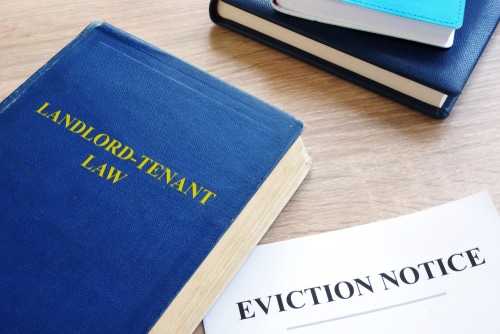How to End a Tenancy Agreement: A Guide for Landlords
Ending a tenancy agreement doesn’t have to be a challenging experience for a landlord, but it is important to follow the correct procedure. If you are looking to bring a rental to an end, this simple guide on how to end a tenancy agreement should prove useful, and keep you within the law.
Ending a tenancy agreement doesn’t have to be a challenging experience for a landlord, but it is important to follow the correct procedure. If you are looking to bring a rental to an end, this simple guide on how to end a tenancy agreement should prove useful, and keep you within the law.
If you are looking to bring a tenancy to an end, you will need to give your tenants notice in a particular way, including providing them with particular information and warnings.
How you proceed will depend on the type of tenancy agreement that is in place.
Assured shorthold tenancies (ASTs)
In certain circumstances, you can take back possession of your property without having to provide a reason. You can only do this however if all of the following apply:
- You have protected your tenants’ deposit in a deposit protection scheme
- The leaving date you have given your tenants is at least six months after the original tenancy started
- The tenancy is periodic, or fixed term and you are not asking the tenants to leave before the end of that fixed term
What is the notice period for ASTs?
Tenants must be provided with written notice that you want to take back possession of the property. This is known as ‘notice to quit’, and the date by which the tenants must leave should be clearly stated.
The notice period should be at least:
- 2 months if you gave notice before 26 March 2020
- 3 months if you gave notice between 26 March 2020 and 28 August 2020
- 6 months if you gave notice on or after 29 August 2020
If you issued a section 8 notice then the notice period could be shorter, depending on the reason for eviction. This change is because of coronavirus (COVID-19).
How to end an assured shorthold tenancy during a fixed term?
If you’re still within a fixed term, you are only able to ask your tenants to leave if you have a reason for wanting possession that’s listed in the Housing Act 1988. Examples include tenants being in arrears with rental payments, and tenants having used the property for illegal purposes.
It is important to follow the rules on how to end a tenancy agreement early.
If you issued your tenants with notice prior to 26 March 2020, then you would have needed to have provided up to two months to leave, depending on the reason. However, due to the COVID-19 pandemic, in most cases now you must provide a longer notice period.
If you gave notice between 26 March 2020 and 28 August 2020, the notice period must have been a minimum of three months.
If you gave notice on or after 29 August 2020, the notice period must be at least six months, although in some cases it can be shorter, for example if you need to evict tenants for antisocial behaviour.
The Ministry of Housing, Communities and Local Government provides more information on reasons for possession for properties let through an assured shorthold tenancy.
Assured tenancies
To bring an assured tenancy to an end, you will need to use one of the reasons for possession as listed in the Housing Act 1988.
Excluded tenancies or licences
If you let a room in the property in which you yourself live to a lodger, this will usually fall under an excluded tenancy or licence.
In such cases, you’ll only need to give ‘reasonable notice’ to quit. This usually means the length of the rental payment period. So, if you collect rent on a monthly basis, you will need to give one month’s notice. This notice does not have to be in writing.
Non-excluded tenancies or licences
You can end a non-excluded tenancy or licence at any time by serving a written ‘notice to quit’. The notice period will depend on the individual tenancy or agreement that’s in place, but it will usually be a minimum of four weeks.
What if there is a break clause in the tenancy agreement?
For tenancies that include a break clause, it is possible to issue tenants with notice after this. However, you do not have a guaranteed right to possession during the first six months of the tenancy.
What if the tenant won’t leave the property?
If your tenant refuses to leave the property, you will need to tread carefully.
You are not permitted to remove the tenants by force. If the notice period expires and the tenants still haven’t left, then you can commence the process of eviction through the courts.
If you are going down this route, then you will need to follow the strict procedures that are in place for each type of tenancy.
It is important to be aware that currently, due to COVID-19, bailiffs will not evict your tenants if your property is in England or Wales, unless there’s a serious reason. Such reasons include illegal possession, antisocial behaviour and, for properties in England, six or more months’ worth of rent arrears. If you have a serious reason to evict your tenants, it is vital to read the guidance about what you need to do.
Want to avoid legal wrangles over tenancies and evictions?
Hand over your property management to homes2let, and enjoy guaranteed rent into the bargain.
Ending a tenancy agreement isn’t always difficult, but there are strict rules to follow if you are going to stay on the right side of the law.
If you’d prefer not to have to deal with this side of being a landlord, why not hand over your property management to homes2let and take advantage of our guaranteed rent scheme at the same time?
Not only will we handle every aspect of the legal side of renting your property, we’ll also take care of day to day maintenance, property inspections and tenant sourcing, as well guaranteeing your rent every month, even during void periods.
To learn more about how we can make your life easier as a buy to let investor, please get in touch with our helpful team.
Related Insights

London Borough of Culture 2023 a Boon for Croydon
Introduced by Mayor of London Sadiq Khan in 2017, the Mayor’s London Borough of Culture award offers more than £1m of funding for boroughs to host a range of cultural events, activities and initiatives over a whole year. In spring 2019, the mayor announced that Croydon had won the award for 2023. As the celebrations draw closer, we look at how this important accolade will make a difference to the borough, and potentially make it more attractive to buy-to-let investors.

How to Reduce Your Buy To Let Property Tax Bill
Being a landlord in the UK offers significant opportunities for profit. Learn actionable strategies to reduce your rental property tax bill and maximize your earnings effectively and legally.

Landlords: How to Avoid Fines for Non-Compliance with Lettings Legislation
Property industry reports reveal that local authorities and Trading Standards enforcers are starting to take an even stricter line when it comes to making sure private landlords are compliant with regulations, leaving some rental property providers with fines ranging from £48,000 to £330,000 due to failures.







